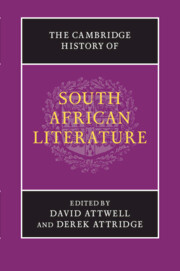Book contents
- Frontmatter
- Introduction
- PART I ORATURES, ORAL HISTORIES, ORIGINS
- PART II EXPLORATION, EARLY MODERNITY AND ENLIGHTENMENT AT THE CAPE, 1488–1820
- PART III EMPIRE, RESISTANCE AND NATIONAL BEGINNINGS, 1820–1910
- PART IV MODERNISM AND TRANSNATIONAL CULTURE, 1910–1948
- PART V APARTHEID AND ITS AFTERMATH, 1948 TO THE PRESENT
- PART VI SOUTH AFRICAN LITERATURE: CONTINUITIES AND CONTRASTS
- 33 South Africa in the global imaginary
- 34 Confession and autobiography
- 35 ‘A change of tongue’: questions of translation
- 36 Writing women
- 37 The experimental line in fiction
- 38 The book in South Africa
- 39 Literary and cultural criticism in South Africa
- Index
- References
39 - Literary and cultural criticism in South Africa
from PART VI - SOUTH AFRICAN LITERATURE: CONTINUITIES AND CONTRASTS
Published online by Cambridge University Press: 28 January 2012
- Frontmatter
- Introduction
- PART I ORATURES, ORAL HISTORIES, ORIGINS
- PART II EXPLORATION, EARLY MODERNITY AND ENLIGHTENMENT AT THE CAPE, 1488–1820
- PART III EMPIRE, RESISTANCE AND NATIONAL BEGINNINGS, 1820–1910
- PART IV MODERNISM AND TRANSNATIONAL CULTURE, 1910–1948
- PART V APARTHEID AND ITS AFTERMATH, 1948 TO THE PRESENT
- PART VI SOUTH AFRICAN LITERATURE: CONTINUITIES AND CONTRASTS
- 33 South Africa in the global imaginary
- 34 Confession and autobiography
- 35 ‘A change of tongue’: questions of translation
- 36 Writing women
- 37 The experimental line in fiction
- 38 The book in South Africa
- 39 Literary and cultural criticism in South Africa
- Index
- References
Summary
Nineteenth-century origins
Many enduring characteristics of South African literary and cultural criticism are evident in the very first articles, book and theatre reviews and lectures that appeared in the small-circulation newspapers and periodicals of the Cape. These early newspapers included John Fairbairn and Thomas Pringle's South African Commercial Advertiser (1824–69), William Bridekirk's South African Chronicle (1824–6), Frederick Brooks's South African Grins; or, The Quizzical Depot of General Humbug (1825–6), Joseph Suasso de Lima's De Verzamelaar/The Gleaner (1826–7), C. E. Boniface and C. N. Neethling's Zuid-Afrikaan (1830–71), A. J. Jardine's Cape of Good Hope Literary Gazette (1830–5), and Robert Godlonton's Graham's Town Journal (1831–1919) (Huigen, ‘Neder-landstalige’, pp. 7–11; Lewin Robinson, None Daring). The periodicals of this period – Fairbairn and Pringle's South African Journal (1824), Abraham Faure's Het Nederduytsch Zuid-Afrikaansche Tydschrift (1824–43), Andrew Smith and James Adamson's South African Quarterly Journal (1830–7) and James L. Fitzpatrick's Cape of Good Hope Literary Magazine (1847–8) – were dominated by articles on the natural sciences, history and travel, and there were only occasional pieces of literary or cultural criticism, like Fairbairn's two-part essay ‘On the Writings of Wordsworth’ in the South African Journal (1 [1824], pp. 12–16, and 2 [1824], pp. 107–17), and the anonymous ‘On the Sources of Shakespeare's Plots’ in the Cape of Good Hope Literary Magazine (2, 10 [1848], pp. 571–92).
- Type
- Chapter
- Information
- The Cambridge History of South African Literature , pp. 818 - 837Publisher: Cambridge University PressPrint publication year: 2012
References
- 3
- Cited by



